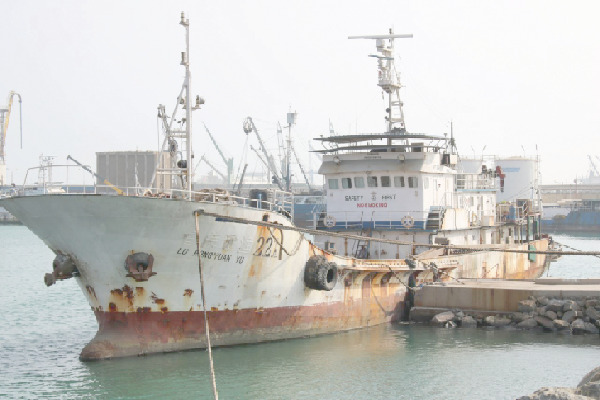
Tuna association appeals for reduction of fees on vessels
The Ghana Tuna Association (GTA) has appealed to the government to reduce fees on tuna vessels, especially in this time of the COVID-19 pandemic when businesses are reeling from economic pressure, with some being given bailouts.
It claimed that the introduction of high licensing fees on tuna vessels had affected the production of tuna and led to redundancy among workers in the sector.
The fees were adjusted from $35 to $135 per gross registered tonnage (GRT), meaning that under the new fee regime, vessels of 1,000 tonnage are required to pay an annual fee of $135,000, while those with higher tonnage of 1,500 GRT could pay in excess of $200,000.
The President of the GTA, Mr John Davidson, who made the appeal, said not only had the 15 locally owned vessels been laid up or made temporarily idle but that 45 crew members of the laid up vessels, stevedoring staff and casual labourers, numbering about 3,000, had been made redundant since January 2020 when the vessels became inactive.
The situation, he said, had also affected the production of some tuna processing companies and those in the Free Zones area, which had either shut down operations or reduced their production levels.
“Companies such as JL Fisheries, Trust Fishing Ventures, D&H Fishing and Maroc Logistics have all shut down their operations, as they are unable to afford the fees, coupled with the ban on bait harvesting using light,” he said.
Agreement
Mr Davidson claimed that although an agreement was reached among stakeholders on February 14, 2020 to adjust the rate from $35 per GRT to $65, that had not been followed through because the authorities had insisted on the $135 per GRT.
He said engagements with the Ministry of Fisheries and Aquaculture Development and the Fisheries Commission outlined modalities for the adjustment of the fee from $35 per GRT to $65 per GRT, which is a 75 per cent rise on the existing rate, the authorities insisted on $135, from an initial increase of $200.
“Our expectation was to sign a memorandum of understanding (MoU) after we had reached an agreement on the $65 per GRT, but that has not been the case, since the ministry and the commission have not been cooperative,” he alleged.
The meeting also proposed the need for pole and line vessels to pay 50 per cent of an agreed fee of $65 for the remaining quarters of the year to give them some room to recover and also be allowed to undertake bait fishing using light as they strategised to pay the full increment in the 2021 season.
Fisheries Commission
The Executive Director of the Fisheries Commission, Mr Michael Arthur Dadzie, said the commission, together with the leadership of the GTA, the National Fisheries Association of Ghana (NAFAG) and other stakeholders, had some engagements where a joint proposal was forwarded to the appropriate authorities for attention.
“But I must say that the Cabinet gave approval for the fees to be pegged at $200 per GRT, which was subsequently approved by Parliament for implementation,” he said.
He said the GTA, however, petitioned the Presidency, resulting in a directive given to the parties to engage and come up with a workable solution.
“While we were waiting for Parliament to review the new fees, the Presidency gave an order for the $200 to be reduced to $135, and that is what we have been implementing. We made the group know that Parliament has not reviewed the fees to reflect the new figure directed by the Presidency,” Mr Dadzie explained, and wondered why the group claimed the commission was not being cooperative.
On bait fishing using light, he said since pole and line vessels used anchovies for their operations, the group came up with a proposal to be allowed to do light fishing for baits, which was prohibited under the law.
“Our response was that we could explore, on experimental basis, which is an acceptable practice, to bring on board the light to attract the anchovies, so they could stay in business,” he said.
However, Mr Dadzie said they risked having issues with artisanal fishermen in the Keta and Saltpond areas, where the anchovies resources were located, since those groups of fishermen were also aware of the prohibition laws on bait fishing.
